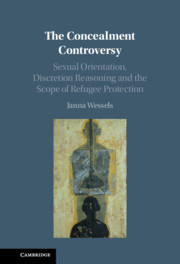 The Concealment Controversy
The Concealment Controversy A Turning Point?
from Part I - Tracing ‘Discretion’ Reasoning
Published online by Cambridge University Press: 19 July 2021
Chapter 3 introduces the empirical Part I, which examines decision-making practice concerning sexuality-based claims in France, Germany and Spain in order to analyse the extent to which ‘discretion’ logics operate. The analysis of jurisprudence in these three countries is essentially longitudinal. It assesses jurisprudence in ‘time slices’ before and after the Europeanisation of asylum and the rejection of the ‘discretion’ requirement in three high-level judgments. Chapter 3 frames this analysis and lays out the legal and jurisprudential context with a view to ‘discretion’ reasoning. It takes a closer look at the EU Qualification Directive, as well as the UK Supreme Court’s 2010 judgment in HJ (Iran) and HT (Cameroon), and the Court of Justice of the European Union (CJEU) twin judgments Y and Z on religion from 2012 and X, Y and Z on sexual orientation in 2013, to explore the extent to which they reject ‘discretion’ reasoning. On this basis, and using the theoretical lens of the act/identity dichotomy, the guiding question for the subsequent three chapters is whether ‘discretion’ logics were apparent in jurisprudence prior to the Qualification Directive and the three judgments rejecting the duty to be ‘discreet’, and the ways in which they were affected by these developments.
To save this book to your Kindle, first ensure no-reply@cambridge.org is added to your Approved Personal Document E-mail List under your Personal Document Settings on the Manage Your Content and Devices page of your Amazon account. Then enter the ‘name’ part of your Kindle email address below. Find out more about saving to your Kindle.
Note you can select to save to either the @free.kindle.com or @kindle.com variations. ‘@free.kindle.com’ emails are free but can only be saved to your device when it is connected to wi-fi. ‘@kindle.com’ emails can be delivered even when you are not connected to wi-fi, but note that service fees apply.
Find out more about the Kindle Personal Document Service.
To save content items to your account, please confirm that you agree to abide by our usage policies. If this is the first time you use this feature, you will be asked to authorise Cambridge Core to connect with your account. Find out more about saving content to Dropbox.
To save content items to your account, please confirm that you agree to abide by our usage policies. If this is the first time you use this feature, you will be asked to authorise Cambridge Core to connect with your account. Find out more about saving content to Google Drive.